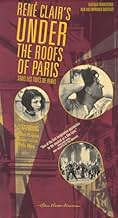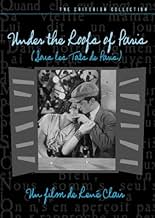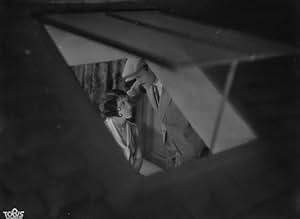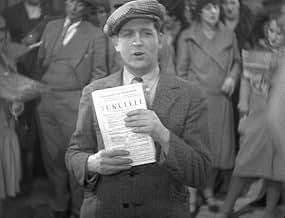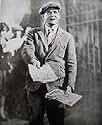PUNTUACIÓN EN IMDb
7,0/10
2,6 mil
TU PUNTUACIÓN
Añade un argumento en tu idiomaAlbert is smitten for Pola but ends up wrongly committed in jail, in the meantime her affections are sought after by his friend, and on his release both love and friendship must be tested.Albert is smitten for Pola but ends up wrongly committed in jail, in the meantime her affections are sought after by his friend, and on his release both love and friendship must be tested.Albert is smitten for Pola but ends up wrongly committed in jail, in the meantime her affections are sought after by his friend, and on his release both love and friendship must be tested.
- Premios
- 1 premio en total
Edmond T. Gréville
- Louis
- (as Edmond Gréville)
Delphine Abdala
- La buraliste
- (sin acreditar)
Raymond Aimos
- Un gars du milieu
- (sin acreditar)
Raymond Blot
- Un membre de la bande à Fred
- (sin acreditar)
Thomy Bourdelle
- François
- (sin acreditar)
Léon Courtois
- L'inspecteur
- (sin acreditar)
Édouard Francomme
- Un membre de la bande à Fred
- (sin acreditar)
André Michaud
- Un agent
- (sin acreditar)
Jane Pierson
- La dame du premier
- (sin acreditar)
Louis Pré Fils
- Le locataire du troisième
- (sin acreditar)
Eugène Stuber
- Un membre de la bande à Fred
- (sin acreditar)
Louis Zellas
- Le consommateur jaloux
- (sin acreditar)
Reseñas destacadas
"Under the Roofs of Paris" is a film written and directed by René Clair. His direction is lovely--with some creative and lovely camera-work. As far as the story goes, it seems a bit thin.
The film begins with Pola being vigorously dated by Fred. In other words, the thug Fred isn't about to take no for an answer--and Pola is naturally creeped out by him. Ultimately, Fred steals her apartment key and Pola is understandably afraid to return home. When she bumps into Albert, he takes pity for her and takes her home. Over time, they fall for each other. However, Albert is arrested (thanks to his friend Emil) and Fred isn't about to allow Albert and Pola to be together. What's to come of them?
Technically, the film is a mixed bag--though I really cannot fault the film for its deficits. Although the film is part sound and part silent, films outside the United States took much longer to shift to all-talking pictures--so I accept that French films still were making the transition. Sound-wise, this 1930 film is very similar to 1927's "The Jazz Singer"--with a few songs and a bit of dialog but otherwise being essentially a silent film. However, what was very advanced was the camera work and the crane shots--they were very impressive and the film sure looked great.
Apart from the technical, the film had a story that seemed a bit weak. There isn't a lot of depth to the characters, they aren't necessarily likable and I didn't feel all that involved with them. So, overall, it is worth seeing but not a must-see--and not as good as some of the director's other efforts.
The film begins with Pola being vigorously dated by Fred. In other words, the thug Fred isn't about to take no for an answer--and Pola is naturally creeped out by him. Ultimately, Fred steals her apartment key and Pola is understandably afraid to return home. When she bumps into Albert, he takes pity for her and takes her home. Over time, they fall for each other. However, Albert is arrested (thanks to his friend Emil) and Fred isn't about to allow Albert and Pola to be together. What's to come of them?
Technically, the film is a mixed bag--though I really cannot fault the film for its deficits. Although the film is part sound and part silent, films outside the United States took much longer to shift to all-talking pictures--so I accept that French films still were making the transition. Sound-wise, this 1930 film is very similar to 1927's "The Jazz Singer"--with a few songs and a bit of dialog but otherwise being essentially a silent film. However, what was very advanced was the camera work and the crane shots--they were very impressive and the film sure looked great.
Apart from the technical, the film had a story that seemed a bit weak. There isn't a lot of depth to the characters, they aren't necessarily likable and I didn't feel all that involved with them. So, overall, it is worth seeing but not a must-see--and not as good as some of the director's other efforts.
René Clair's "Sous les toits de Paris" ("Under the Roofs of Paris" in English) manages to strike the right balance between happy and gritty. This jolly musical tells the story of a love affair between street singer Albert and Romanian immigrant Pola. Or at least, they attempt a romance. They're surrounded by all manner of lowlifes. This is not the gay Paree that we expect.
Released when talkies were still in their relative infancy, the movie has sound scenes, but also silent ones. It finds the right balance between them. Moreover, the characters are complex if lowly individuals. Watching it all these years later, I wonder which direction French cinema would've taken had World War II not happened.
Anyway, outstanding movie. Not the greatest by any stretch, but still impressive.
Released when talkies were still in their relative infancy, the movie has sound scenes, but also silent ones. It finds the right balance between them. Moreover, the characters are complex if lowly individuals. Watching it all these years later, I wonder which direction French cinema would've taken had World War II not happened.
Anyway, outstanding movie. Not the greatest by any stretch, but still impressive.
The film marvellously shows the nostalgic dream of the old Paris and its common people. With melancholic irony, Clair tells a story of the milieu of backstreets and backyards, of street singers, pickpockets, fiddlers and strange townsmen. Here, his grasp into the present does not become realistic depictions of circumstances, but a poetic romance, for which reality is only one aspect of life.
In this regard, especially the sound has turned out quite well. And how hesitantly Clair used this new technical innovation! His generally critical attitude towards sound in films induced, that "Sous les toits" is mainly composed of silent parts (including many dialog scenes), which are highlighted with music or noises such as trains driving past. The song "Sous Les Toits De Paris" of Albert, the street singer, becomes to the red thread which links several scenes and bridges time distances. A fight taking place in the dark only informs the viewer through noises. For that, we witness a dispute, where the matter is uninteresting and predictable, without any sound - shot through a glass door. One can say sound is especially used for enrichment and left out when it would be needless. Thus, a film came into being that wonderfully combines sentiment, humor and intelligence with languishingly beautiful tunes.
In this regard, especially the sound has turned out quite well. And how hesitantly Clair used this new technical innovation! His generally critical attitude towards sound in films induced, that "Sous les toits" is mainly composed of silent parts (including many dialog scenes), which are highlighted with music or noises such as trains driving past. The song "Sous Les Toits De Paris" of Albert, the street singer, becomes to the red thread which links several scenes and bridges time distances. A fight taking place in the dark only informs the viewer through noises. For that, we witness a dispute, where the matter is uninteresting and predictable, without any sound - shot through a glass door. One can say sound is especially used for enrichment and left out when it would be needless. Thus, a film came into being that wonderfully combines sentiment, humor and intelligence with languishingly beautiful tunes.
Having been highly impressed by "Le Million", I decided to check out Rene Clair's other acclaimed musical comedy, "Under the Roofs of Paris". I can happily assure you that this film was even better than "Le Million" in almost every single way. It amps up the heart and humor, has a much stronger emotional impact, and, while "Le Million" felt like a purely plot driven film, "Under the Roofs of Paris" balances plot and character to near perfection.
This hilarious love story unfolds slowly and steadily, introducing the audience to different characters and places without rushing everything. We watch and learn before the plot strikes us like a lightning bolt of beauty. Rene Clair's camera beautifully glides through the streets of Paris, following characters and peaking in on their most fragile moments. This film is like the finest work of literature; it contains laughs and tears, moments of melancholy and hope. It is, simply, a masterpiece.
This hilarious love story unfolds slowly and steadily, introducing the audience to different characters and places without rushing everything. We watch and learn before the plot strikes us like a lightning bolt of beauty. Rene Clair's camera beautifully glides through the streets of Paris, following characters and peaking in on their most fragile moments. This film is like the finest work of literature; it contains laughs and tears, moments of melancholy and hope. It is, simply, a masterpiece.
"Sous les toits de Paris", a 1930 comedy/drama was René Clairs first venture into sound film making - and is already a masterful showcase for the use of sound. It is actually a blend between silent movie and talking movie with whole sections being without any sound or the dialogue turned off. In its deliberate use of sound, the movie reminded me of Fritz Lang's "M".
Also, the sets are fantastic. They show the "lower" quarters of Paris as both a fantastic place and a realist place. It gives the movie a very nice touch.
But the story isn't that fantastic. It's a simplistic plot about a man falling in love. He's getting arrested. In the meantime, his best friend falls in love with his girl. I think Clair wasn't out to write something terribly new but used this simple, yet lovely story to carry his technical idea about sound (he was at that time still a strong defender of the silent cinema). Also, he wanted to show the "other" life in Paris, the low life. And he succeeds quite well at that.
All that said, however, I have to add that this isn't my kind of film. I appreciate its virtuoso style for its time, I even might consider it a classic to some extend because it led the way for a generation of film makers - but personally, it doesn't do much for me. I watch it sort of emotionless. Overall, I'd give it a very personal
6/10
Also, the sets are fantastic. They show the "lower" quarters of Paris as both a fantastic place and a realist place. It gives the movie a very nice touch.
But the story isn't that fantastic. It's a simplistic plot about a man falling in love. He's getting arrested. In the meantime, his best friend falls in love with his girl. I think Clair wasn't out to write something terribly new but used this simple, yet lovely story to carry his technical idea about sound (he was at that time still a strong defender of the silent cinema). Also, he wanted to show the "other" life in Paris, the low life. And he succeeds quite well at that.
All that said, however, I have to add that this isn't my kind of film. I appreciate its virtuoso style for its time, I even might consider it a classic to some extend because it led the way for a generation of film makers - but personally, it doesn't do much for me. I watch it sort of emotionless. Overall, I'd give it a very personal
6/10
¿Sabías que...?
- CuriosidadesThe opening sequence and the street scenes were filmed in a studio.
- Citas
Albert, a young street singer: [On seeing Pola bedding down on his bedroom floor] Okay, take the bed, I'll sleep on the floor.
- ConexionesFeatured in Les dossiers de l'écran: Boulevard du crépuscule (1969)
Selecciones populares
Inicia sesión para calificar y añadir a tu lista para recibir recomendaciones personalizadas
- How long is Under the Roofs of Paris?Con tecnología de Alexa
Detalles
- Duración1 hora 36 minutos
- Color
Contribuir a esta página
Sugerir un cambio o añadir el contenido que falta

Principal laguna de datos
By what name was Bajo los techos de París (1930) officially released in India in English?
Responde


